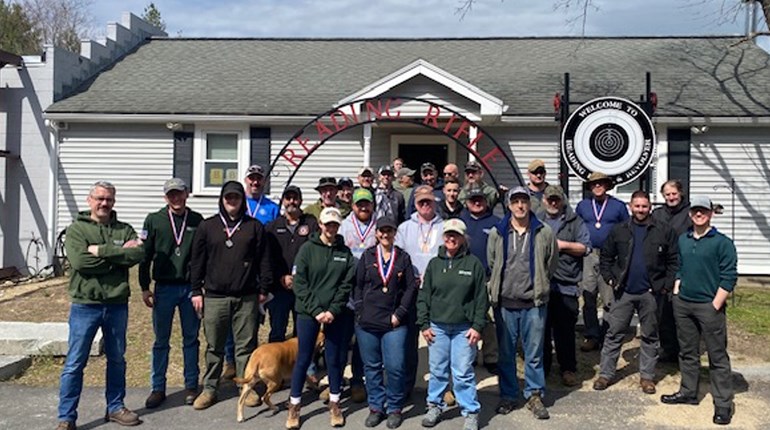
Since 1907, Camp Perry on the Ohio shores of western Lake Erie has hosted the NRA National Rifle and Pistol Matches. But few people today realize that, for several years during the mid-1940s, Camp Perry served a very different purpose. It was a prisoner-of-war (POW) camp, housing some 6,000 German and Italian prisoners in America’s heartland.
During World War II, the United States maintained 511 base camps and 175 branch camps within its borders, containing nearly 430,000 prisoners. There were more camps in the eastern half of our nation than the west, and all but three states—Nevada, Montana and North Dakota—had POW camps.
The camps were established to help alleviate the overcrowding of POWs housed in Great Britain. Had just Italian (50,273) and Japanese (3,915) POWs been shipped to the U.S., American camps could have easily handled those numbers. But when an additional 371,683 German prisoners began debarking from troop ships onto America’s shores late in the war, the POW prison system was soon overwhelmed. U.S. military leaders went scrambling to find suitable camp locations, construct facilities, train guards, interpreters and other support personnel—a monumental task.
Camp Perry was considered a major POW base camp, and had several smaller branch camps located in or near seven Ohio cities, as well as Fort Wayne, Indiana. Italian soldiers captured on European battlefields began arriving at Camp Perry in 1943, followed by German soldiers in 1944. A small portion of the Germans, an estimated 10 percent, were hardcore Nazi sympathizers. Most of those were former Rommel Afrika Korps members who still firmly believed that Germany would ultimately win the war. As a result, they often intimidated the other German prisoners who were less enthusiastic toward Nazi beliefs, through verbal and physical abuse.
The prisoners at Camp Perry were housed in small, wood-framed, tar-papered-covered buildings, groupings of which were called “hutments.” Measuring 16’X16’, each building was a single story constructed on a concrete slab, double-walled with double-pane windows, and heated by a wood-burning stove. Five prisoners were assigned per building. A nine-strand, barbed-wire fence 9 feet high, with 11 guard towers, enclosed the entire encampment.
Prisoners were required to work while at the camp, doing daily routine maintenance of the many buildings, cooking, cleaning and other chores, as needed. As a result, they earned a small number of coupons per day which they could then redeem at the prison “canteen,” what today would be known as the camp PX, or Post Exchange. Officers were exempt from working if they so chose, but many worked to help pass the time and ease the boredom of routine prison life.
An interesting aside is that the German prisoners did not think much of the American 3.2 percent alcohol beer they could purchase at the camp PX for 10 cents per bottle—it was just too bland and mild for their tastes. However, they did like the Coca-Cola that sold for four cents per bottle.
Some POWs worked offsite of Camp Perry, employed at area businesses or planting and harvesting farm crops; overseen, of course, by armed camp guards. Northwest Ohio has some of the most productive farmland in the world, but due to the ongoing war effort able-bodied American farmhands were in short supply in the 1940s. As a result, POWs were often pressed into service, and this decision was not always popular with local civilians. They claimed that POWs were filling paying jobs that should have gone to them.
There was also cultural resentment of the POWs. For instance, at one canning company German prisoners worked alongside American civilian women whose husbands and sons were fighting German forces overseas.
Another complaint heard from civilians was that prisoners were being coddled. As part of the war effort, food rationing of meats and canned goods was in effect for all Americans. Yet they saw prisoners being provided three meals each day, sometimes eating the brand-name foods citizens couldn’t readily obtain.
On the other hand, certain civilians took the food disparity issue and the fact that they had a POW camp in their backyard philosophically. A story in the October 1, 1943, Port Clinton Herald and Republican newspaper quoted an area resident as saying, “This is war, and we’ll just have to make the best of it.”
Some civilians went out of their way to interact with the prisoners, while others refused to have anything to do with them. One Ohio resident, who chose to get to know some of the men at Camp Perry, commented, “You could tell the Germans from the Italians because the Italians were laid-back and so friendly, while the Germans were stoic and stern and did not talk much, although they worked hard.”
Did any POWs ever escape from Camp Perry or any of its satellite camps? There were several attempts. In January 1945, a prison guard shot and killed a German prisoner who had threatened him. The guard lost his footing on icy ground and was rushed by the prisoner, whom he then shot. The guard underwent a court-martial for the shooting, but was found not guilty.
If a prisoner tried to escape and was caught, or purposely violated any other major rule, he was placed in solitary confinement and put on a diet of bread and water three times per day. (At the time, such treatment of prisoners was in alignment with the Geneva Convention of 1929.)
Suicides were less common than escape attempts, but a few did happen. One POW who slipped away from a work detail near Defiance, Ohio, was found a few hours later drowned in the Maumee River. Another prisoner, who had allegedly escaped from Camp Perry, was found hanging from a tree near Port Clinton about a week later. Camp officials described him as mentally imbalanced and, until his body was discovered, the only German prisoner who had successfully escaped from the camp.
May 8, 1945, V-E Day (Victory in Europe), marked the end of World War II in Europe, with Japan surrendering in the Pacific a few months later that same year. As a result, POWs held in American prison camps, including Camp Perry, began to be sent home to their native countries. Interestingly, a number of German and Italian prisoners eventually returned to America to live permanently and become citizens. Impressed by how well they had been treated as POWs, they wanted to experience the opportunities and freedoms they had seen while in America that their home countries did not offer.
Today, three-quarters of a century after the last POW marched out of Camp Perry, there is still much tangible evidence of that era remaining, thanks to ongoing historic preservation efforts. For instance, the brick buildings known as “Commercial Row” that house firearms vendor displays during the annual National Matches were once the mess halls of the POWs of World War II.






































